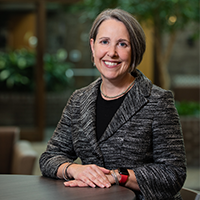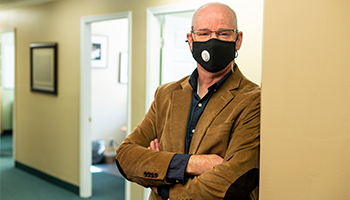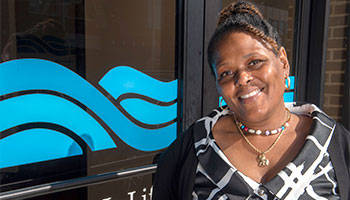A taxing time
Amid pandemic, CPAs are concerned about health, safety
Kate Andrews //October 27, 2020//
A taxing time
Amid pandemic, CPAs are concerned about health, safety
Kate Andrews //October 27, 2020//
In early March, Ryan Losi just arrived home after traveling around the world for 10 of the past 13 weeks. He probably won’t be doing that again for a while.
The executive vice president of Piascik, a Henrico County CPA firm with global clients, Losi had been paying attention to reports of a new virus out of China but didn’t know whether it would have much impact in the United States.
“You’re reading about it and you’re hearing about it, but all of a sudden, our governor took a pretty aggressive approach,” Losi says, recalling Virginia Gov. Ralph Northam’s executive orders closing schools and nonessential businesses in mid-March. By March 21, Piascik closed its office, and as of October, it’s still not open to clients.
“We migrated to the cloud,” he says, with all 22 employees working remotely for the first time on the system in March. “Nobody was in the office at all until June.”
In this year’s Virginia Society of Certified Public Accountants’ survey on current economic conditions and expectations, conducted in partnership with Virginia Business, the safety and health of employees was the top concern for 73% of 162 respondents. Most began working remotely or taking other precautions due to the pandemic in mid-March, when the governor started giving daily updates about the impact of COVID-19 in Virginia.
Henrico-based Keiter was “chugging along” in early March, says managing partner Gary G. Wallace, but by mid-month, with the governor’s orders in place, the firm recommended employees work from home if possible. Out of 160 employees, only 20 or 30 were in the office, and that lasted just a week, until the office closed. “Clients were closing down, too,” Wallace adds. “In terms of getting things done, I think we managed and handled the process very well.”
A COVID-19 task force at Keiter made further decisions, including reopening the office for employees who wanted to return in early June, as well as establishing social distancing policies for clients visiting the office. In July, after the state’s Department of Labor and Industry issued workplace safety guidelines, Keiter implemented a mask policy governing all employees in common spaces and all visiting clients.
About 70 people at Keiter already had at-home work stations including laptops, extra monitors and other necessities, and the firm started using the Microsoft Teams meeting platform in mid-March, Wallace says.
Moving from physical files to cloud-based documents was a multiyear process at Piascik that predated the coronavirus pandemic, Losi notes, but it worked well during the spring and early summer, as the CPAs at Piascik handled clients’ Paycheck Protection Program paperwork and tax returns before this year’s extended July 15 federal tax deadline.
Retaining employees
Other pandemic-related concerns received high marks in the VSCPA survey: 51% of surveyed CPAs identified “work-life balance” as a big concern, and 48% said that “handling stress” related to family and other personal needs was another major consideration. Losing clients and revenue due to business closures was also a top concern for about 47% of respondents.
“In CPA land, they’re laying off massive numbers of CPAs,” Losi says, referring to large firms across the country that laid off 78,000 accountants and bookkeepers in April, according to federal labor statistics. His firm and others were able to stay afloat and keep employees onboard thanks to PPP loans, but “a lot of people in my industry are concerned about the fourth quarter this year and the first quarter next year,” he adds.

VSCPA President and CEO Stephanie Peters says most of her organization’s members are doing OK financially now, in part because in-house CPAs are considered essential workers and independent CPAs have typically been kept on by clients during tough times. VSCPA members have not experienced significant layoffs or furloughs this year, she adds.
According to the survey, nearly 13% of respondents say there were layoffs or furloughs at their firms due to a drop in business, and about 23% were concerned about staying employed.
“Overall, our firm has weathered things pretty well,” says Robert LeMay, principal of Springfield-based LeMay & Co. “We had an increase in revenue compared to last year. It was pretty busy back in July, when people were getting through the first period [of the pandemic].”
LeMay explains that after spending his PPP funds primarily on payroll and saving his employees’ jobs, he cut all overtime for July so that he could sock away some income in anticipation of coming lean months.

“That is what is carrying us now that we are outside of the tax-heavy season and are relying on our business clients solely for consulting and other work,” he says. “For the last month alone, my billings were down about $20,000 from the prior year.”
Hope F. Cupit, president and CEO of the nonprofit Southeast Rural Community Assistance Project Inc. (SERCAP), based in Roanoke, did not apply for PPP loans or other federal funding because SERCAP receives continuous grants that assist its mission of making home-improvement loans to low-income clients in seven states. Two of its grantors provided $300,000 in COVID-19 relief money that helped the organization retain 46 of its 48 employees, Cupit says. (SERCAP laid off two workers.)
In return, SERCAP placed a moratorium on clients’ loan payments until January. “We won’t know the impact [of the pandemic] until we start asking for payments again,” Cupit says. “I want to say by January, if [clients] are not working, we’ll have to do some workarounds with those payments, so we don’t have defaults.”
Changing business models
More than 32% of survey respondents said their businesses are reevaluating their budgets and business plans to ensure long-term stability.
Many CPA firms are cutting travel expenses, as well as event sponsorships and entertainment costs. Piascik cut all contractors at their firm, as well as canceling a planned office expansion, Losi says. “Our goal was to keep all of our employees,” he adds, which the firm achieved.

Some firms, according to the survey, are considering long-term telecommuting options for employees, especially those who have young children at home. Wallace says that about 30% of his team are parents, and a few employees have had to work a reduced schedule due to school being back in session remotely. LeMay has two employees who continue to work from home for the most part because of child care duties.
“Most of our work can be done somewhat flexibly, in terms of time of day,” Wallace says, although he notes that remote work makes training employees and maintaining the firm’s culture more challenging.
But Losi notes that there are also definite pluses to working from home: According to in-house metrics, Piascik’s accountants were 33% more efficient as of July 31, compared with the same period in 2019. Losi is now reminding employees — especially the younger ones with less experience — to take time off, as most of the office has not taken any vacation time since before the pandemic.
Aside from financial and health worries, about 30% of survey respondents said they also are concerned about helping clients or their employers meet government deadlines, and 8% pointed out the challenge of conducting audits while organizations remain closed.
Peters says that clients’ questions about federal funds and how to document them in tax returns will keep Virginia firms busy during the next year.
LeMay says that some businesses will receive a nasty surprise if they didn’t spend their PPP funding before the end of their fiscal year, because the funds will be considered profit, meaning recipient companies will have to pay taxes on those unspent PPP funds.
“That’s where I see the real whammy coming,” he says. Also, many banks were not yet accepting PPP loan forgiveness applications as they waited on federal direction this fall. In early October, the Treasury Department announced that the SBA would begin forgiving loans within a few days — including considering 96,000 applications received through an online portal set up in early August. None had been approved as of late September, though. Nationwide, 5.2 million applicants received $525 billion in PPP loans as of Aug. 8, when the program expired.
LeMay says that during the spring and early summer, his office sent out many newsletters — so many he apologized to clients for “spamming them” — answering questions about “all the unknowns,” including requirements for PPP and other federal CARES Act funding. He also held webinars, after being skeptical about using video before the pandemic.
“For lots of small businesses, it’s a minefield they’re trying to navigate,” LeMay says. “We spent time educating ourselves.”
Related Articles
The Results Of Virginia Society of CPAs’ 2021 Virginia Economic Expectations Survey
-
















